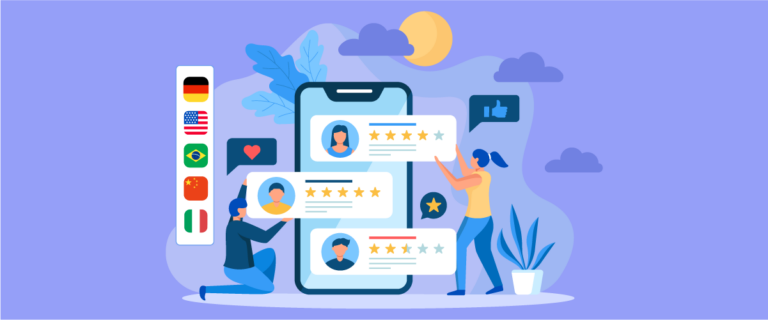Naver Papago is growing in popularity as a go-to translator app, especially among Asian users, including Japanese. With fairly accurate text, voice and image translation features, many people rely on Papago for their daily and work needs. However, an important question arises behind this convenience, “Is Papago safe to use?”
This article will explore the security and privacy behind Papago, from who the developers are, to how your data is managed, to the protection measures in place. We will also discuss safer alternatives for website translation, especially for businesses prioritizing data security.
Keypoints: Papago app's security and privacy
Safe for casual use
Papago is generally secure for personal, non-sensitive translations like travel or menus, using standard HTTPS encryption without permanent data storage.
Risky for sensitive data
Never use Papago for confidential business content, financial data, or personal identification as Naver collects translations for AI training.
Enterprise alternatives
For websites and professional use, opt for secure solutions like Linguise with end-to-end encryption and no data reuse policies.
Who is behind Papago? Understanding Naver Corporation

Papago is a translation application developed by Naver Corporation, a technology company based in South Korea. Naver is widely recognized as one of the internet giants in Asia, largely due to the popularity of its search engine, often referred to as the “Google of South Korea.” In addition to its search engine, Naver has developed various digital services, including Line Messenger, Naver Webtoon, and several other content platforms.
Naver strongly focuses on developing artificial intelligence (AI) and data-driven services as a major tech company. Papago is part of Naver’s initiative to provide practical translation services powered by AI translation technology. This means Papago is not just an ordinary translation app—it continuously collects user data to improve its translation accuracy and performance.
As more people compare Papago with similar services, it’s natural to wonder which option is better for personal or professional use. One of the most common comparisons is between Naver Papago and Google Translate.
Although Naver has a solid reputation across Asia, not everyone outside South Korea knows the company behind Papago. That’s why it’s essential to understand Naver’s background before diving deeper into the discussion about safety and privacy. By knowing more about Naver, you can make a more informed decision on whether their services, including Papago, are safe to use, especially when dealing with sensitive information.
How Papago handle your data?

As a translation service, many users may wonder what data is collected, what it is used for, and how securely it is managed. This section will explain how Papago manages its users’ personal information based on official policies as part of the Naver service.
Data collected by Papago

Several data types will be collected automatically or through user input when you use Papago. Papago collects IP addresses, device information, cookies, access logs, date and time of visits, and service usage records for standard services. If you use Papago Pro or Plus, additional data such as name, email address, mobile number, account information, and payment data may also be collected for service and identity verification.
In addition, Naver may also collect and process content that you upload through its services. This content includes various forms such as text, voice, images, photos, videos, and links that you share to display to yourself or others through Naver services. While you retain the intellectual property rights to the content, uploading it to Naver grants them a license to store, reproduce, display, and make limited modifications such as translation.
Naver states that the content you upload may also be used for service development, promotion, feature enhancement, and research related to artificial intelligence. However, they promise to protect your content and allow you to delete, hide, or control access to it through settings on the Naver service.
How is your data used

Papago collects data for various purposes directly related to service provision. Data is generally used to ensure the service runs properly, such as verifying the user’s identity, processing translation requests, and improving the accuracy of translation results with AI technology.
In addition, Naver utilizes user data for new service development, application quality improvement, as well as for service usage analysis purposes. For example, usage data or access records may be analyzed to understand user behavior patterns and improve the Papago system.
It is important to note that data is only used for marketing or promotion if the user gives separate consent. For example, to send event information, special offers, or giveaways, Papago will ask for additional permission before using your phone number or email address.
Data sharing and third-party access

Naver states they do not indiscriminately share users’ personal information with third parties without consent. However, there are certain conditions under which data may be shared, such as for service analysis, payment processing, or service development with trusted partners.
For example, in Papago or Naver MYBOX services, data such as usage records, device information, or payment results may be shared with partners such as OGQ for photo printing purposes or NBT for event participation confirmation. However, all this data sharing is done according to legal requirements, with the user’s consent, and with storage time restrictions.
In addition, Naver may process or provide data in an anonymized or non-identifiable form for statistical purposes, scientific research, or preservation of records deemed important for the public interest.
How long is your data stored, and how it deleted

Naver implements a data retention policy tailored to the purpose of use. In principle, users’ data will be destroyed when the membership is cancelled or the purpose of use is achieved. However, some data must be kept longer according to regulations, such as transaction or payment records that must be kept for 5 years by law.
Automated or technical data, such as access logs or login history, is usually kept for a shorter time, such as 3 months, unless it is needed for investigation or other legal purposes.
Naver also explains that the data destruction process is done securely, for example by shredding physical documents using a shredder, or deleting electronic files using technical methods that make the data unrecoverable.
How Papago protect your data?

When using a translation app like Papago, it’s natural for users to wonder whether their data is truly safe—especially considering the app processes various data types, from text and voice to images. Fortunately, Papago implements several security measures to protect user data, although there are still limitations you should be aware of.
First, Papago uses encryption when data is transmitted, known as encryption in transit. Any data you send through the app, text, voice, or images, is protected through a secure connection (such as HTTPS). This helps minimize the risk of third-party interception while data is being transferred from your device to Papago’s servers. This is a common standard used by almost all major services to ensure security during data transmission.
Additionally, Naver, Papago’s developer, allows users to request the deletion of certain data from the system in accordance with applicable policies. However, it’s important to note that Papago still collects a wide range of data, including personal information such as your name, email address, phone number, photos, voice recordings, and app activity. Some of this data may even be shared with third parties for service-related purposes or performance analysis.
So, while Papago offers basic protection such as encryption and data deletion options, users still need to exercise caution when dealing with highly sensitive or confidential information.
Is Papago safe for personal and business use?

Many people use Papago for everyday needs, from translating simple conversations to understanding foreign texts. However, when it comes to security, it’s important to understand that the security level of an app can differ depending on whether you’re using it for personal or business purposes. The following explains whether Papago is secure enough for both needs.
For personal use
Papago is generally safe for personal purposes, especially when translating non-sensitive texts. For example, Papago can translate food menus, small talk, travel texts, or even news articles. The risk is low as long as the translated content does not contain sensitive personal information such as financial data, identity documents, or medical information.
The app also applies standard encryption when sending data (such as via HTTPS), thus preventing eavesdropping when you access the service. However, remember that most data, such as text, metadata, and usage records, are still collected and used by Naver for service improvement or artificial intelligence research.
So, Papago is pretty safe for casual or everyday use, as long as you don’t enter any confidential or personal information.
For business use
For business purposes, Papago’s use needs to be considered more carefully. Especially if you want to translate documents that contain sensitive data such as employment contracts, financial reports, business strategies, or internal company documents, although Naver has a security system, the data you upload can still be collected, stored, and even used to improve their services or AI research.
For example, if your company translates cooperation proposals or client data using Papago, there is a potential risk that the data goes to a third-party system and is stored for a certain period. In addition, the license to use the uploaded content gives Naver the right to process and modify (including for translation), albeit within the terms of service limits.
Therefore, for business needs involving sensitive data, it is highly recommended to use more controlled and privacy-focused solutions, such as website translation services that offer end-to-end security, without the risk of data being used for anything other than translation needs.
Papago alternative with better security using Linguise

While Papago is reliable enough for translating everyday conversations, many businesses and website owners still require a more secure alternative, especially when dealing with content that contains sensitive data. As discussed earlier, Papago collects user data, and any content you upload can be processed or used to support Naver’s AI development. This raises concerns, particularly if you translate websites that store critical information such as client data, transactions, or internal documents.
This is where Linguise comes in as a safer alternative to Papago. Linguise is an automated website translation service that prioritizes data security, specifically designed for businesses that cannot afford to risk their data being processed or used beyond translation purposes.
Key security advantages of Linguise over Papago:
- Sensible data stays safe on your server – Linguise never accesses or stores sensitive data from your website, such as usernames, passwords, form content, or other private information. The translation process only applies to public website content intended for display to users.
- Local cache system for translated content – All translation results are stored in your website’s local cache. This means once the initial translation is completed, Linguise no longer needs to access that page. The system reduces the risk of repeated external access to your website content.
- No data exploitation for AI development – Unlike Papago, which utilizes user data for AI research and development, Linguise does not use your website content or translation results beyond translating your pages.
- Full control over translation and data access – With Linguise, you retain complete control over your translated content. You can edit, delete, or publish content as needed, without third-party interference.
For businesses that prioritize data security, especially websites containing sensitive information, Linguise offers a far safer solution without sacrificing the convenience of automated translation. You can rest assured that your data will not be exploited for other purposes, which is often risky with free translation tools like Papago.
Conclusion
Papago is safe enough for everyday personal translation if you don’t enter highly sensitive data. The app comes with encryption when data is transmitted and provides a data deletion option upon user request. However, it’s important to understand that Naver still collects most data, such as app activity, uploaded content, and personal data, for service development, AI research, and promotion purposes. This poses a potential privacy risk, especially if used for important documents.
For more serious business needs, especially those involving client data, confidential documents, or strategic information, we recommend choosing an alternative that offers full control over your data. One of the best options is Linguise, a website translation service with end-to-end security, without the risk of data being processed for other purposes.
With Linguise, you can translate your website or business-critical content without worrying about data leakage or data use beyond your primary needs.




